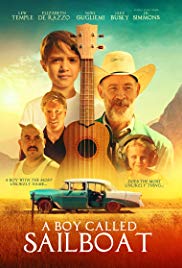
A BOY CALLED SAILBOAT
US, 2018, 92 minutes, Colour.
Julian Atocani Sanchez, Keanu Wilson, Noel G, Elizabeth De Razzo, Jake Busey, J.K.Simmons.
Directed by Cameron Nugent.
While this is a very American story, focus on a Hispanic family living on the border, it was, in fact, written and directed by Australian actor, Cameron Nugent. Nugent began his media life as an actor in a great deal of Australian children’s television, so he can draw on the experience of telling children stories.
And, this is what A Boy Called Sailboat is, the story of a little boy, Sailboat, age 6, living with his parents, his father working as a handyman at the local school, his mother at home, cooking ever more frequently meatballs. They live in a rather ramshackle house which, at first glance, looks lopsided. And, it is, held more or less upright by a long beam which the father continually hovers over in case of the collapse (spoiler alert: at one stage it does collapse), but making every effort to make the house upstanding again.
In fact, given so many aspects of magic realism in the story and in the characters, this is a small family film which would could be called a fable. And, so much of it is seen from the perspective of the six-year-old Sailboat.
One day he finds a small discarded guitar, sets himself to learn to play it, encouraged by his parents, as well as the little girl at school. On a visit to his ailing grandmother in hospital, he decides that he must compose a song for her. And, over the weeks, he does. And, it seems to be the most charming and beguiling song ever written, melting all those who listen to it, fascinating the other children and their teacher, crowds gathering outside the house to hear Sailboat seen.
And, with the beauty of the song, its message, its tears – the only people not to hear it of the film’s audience, the writer-director using the device of the soundtrack going silent, the audience watching the boy and the audience, not hearing any sound and so, having to supply whatever wonderful song, music and lyrics, that appeal to them. The audience is asked to supply its own beauty and message.
The film has quite a lot of detail, the genial parents, both large and affectionate, always enjoying the meatballs and, increasingly cooking them to distribute to the ever-gathering larger crowds. Jake Busey does an odd turn as the enthusiastic teacher who might not get employment in a school with demanding requirements. He is a nice man. He fosters the song and singing. Then there is the little boy, Peeti, not much older than Sailboat who spends his life kicking a football and putting drops in his eyes because he cannot blink. There is also an entrepreneur who wants to get Sailboat on the radio.
The film has won a number of awards as a family film and, it might delight families, especially the youngsters who can identify with Sailboat and Peeti. The adult audience must let itself succumb to the magic realism of the story and characters - and supply the most beautiful song and message that they know.
1. The title? A little boy aged 6? The junkyard and the Sailboat and his desire to have it?
2. The writer-director, his Australian background in children’s television? His ability in telling a child’s story? The child’s point of view? A fable?
3. The locations, the border and New Mexico? Hispanic families? White American families? The musical score?
4. The song that Sailboat composes, the range of songs in the musical score, the fact that his song is never heard by the audience, the response of those who hear it, rapture and tears, happiness? The audience having to supply its own song and melody and emotion?
5. Sailboat, his family, the Hispanic father, the old car, the old house and its leaning, held up by the pole? His mother, large, cooking, the meatballs, the family enjoying them?
6. Sailboat, his friend Peeti, Peeti kicking the ball, his dry eyes and the need to moisten them continually? The friendship between the two boys?
7. The young girl, her family, at school, her interest in Sailboat, visiting him, the music and the guitar, her supporting him, the friendship between the two?
8. The junkyard dealer, driving, the Sailboat, his goods, his sales pitches?
9. At school, the teacher, eccentric, his classes, the behaviour of the children? The football matches? The sports master, the families watching, the games? The expedition, the bus, breaking down? The teacher and his personality? Supporting the song?
10. Sailboat finding the guitar, fixing it, learning to play, practising? The response of his father?
11. The house, the collapse, getting the vehicle to pull the pole upright, setting the house right?
12. Sailboat, his grandmother, her illness, the visits? Her wanting a song?
13. Sailboat, his contemplation, the creation of the song?
14. The song, performing it, the family, the grandmother, the children at school, the crowds gathering of the house, ever-increasing numbers? (And the mother cooking and distributing ever more meatballs?)
15. The entrepreneur, curiosity about the song, meeting Sailboat, Sailboat going off with him, the discussions in the car? At the radio station, the DJ unwilling? Hearing the song? Its possibilities?
16. Audiences responding to the characters in the story? The experience of the song, even not hearing it? And a fable about human nature and goodness?